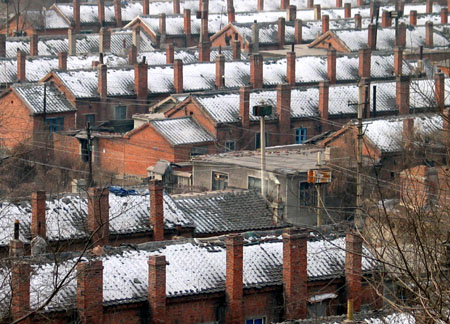Top News
Shantytown residents make a move
By Li Qian (Chinadaily.com.cn)
Updated: 2007-02-14 16:49
 |
Large Medium Small |
 A general view of a shantytown in Fushun, northeast China's Liaoning Province on February 8, 2007. These shanty buildings will soon be demolished and new partments will be constructed by local government in an effort to improve shantytown residents' living conditions. [Chinadaily.com.cn] |
Li Keqiang, on the twentieth day of his duty as Secretary of CPC Liaoning Provincial Committee in December 2004, visited a shantytown area, home to thousands of families in Fushun. Shocked by the miserable living conditions, Li promised to fulfill their long-awaited hopes. "We have resolved to settle your problems. It won't be too long," he told a resident, in a video footage released by the provincial government.
Starting in March 2005, the large-scale shantytown renovation project swept through 11 cities, mostly natural resource-exhaustion cities, not including Shenyang, the capital, Dalian or Anshan, the three major cities in Liaoning. Over the past two years, more than 1.2 million square metres of large shantytowns were demolished throughout the province and 1.9 million sq m. of new apartments were constructed, an astonishing rate, considering that the cold from December to April makes construction impossible.
The project cost 20 billion yuan so far, benefiting a population of 1.2 million, or 345,000 families. The provincial government has worked out a secondary scheme aimed to rebuild shantytowns with areas between 10,000 and 50,000 square metres in 2007.
According to house distribution methods, each family can acquire the same area as the room they moved out of for free, and the extra area of a bigger flat was sold for 600 yuan per sq m., while the current average price in Liaoning's small cities is around 2,000 yuan per sq m.
Along with the housing project, high unemployment and other social problems stemming from the existence of shantytowns were addressed within a general consideration and working coalition of different governmental sectors.
Life could not have been more harsh for Bai Lijuan, a polio-stricken woman in Fushun. Her husband suffered from spinal problems, and their only son was afflicted with cerebral palsy. They have no money to pay for the extra square metres of the new flat. With the help of local government, they acquired their new home for free, Bai found a job making candle holders at home and, with donations collected from other citizens, the boy was sent to a large hospital in Beijing for medical care.